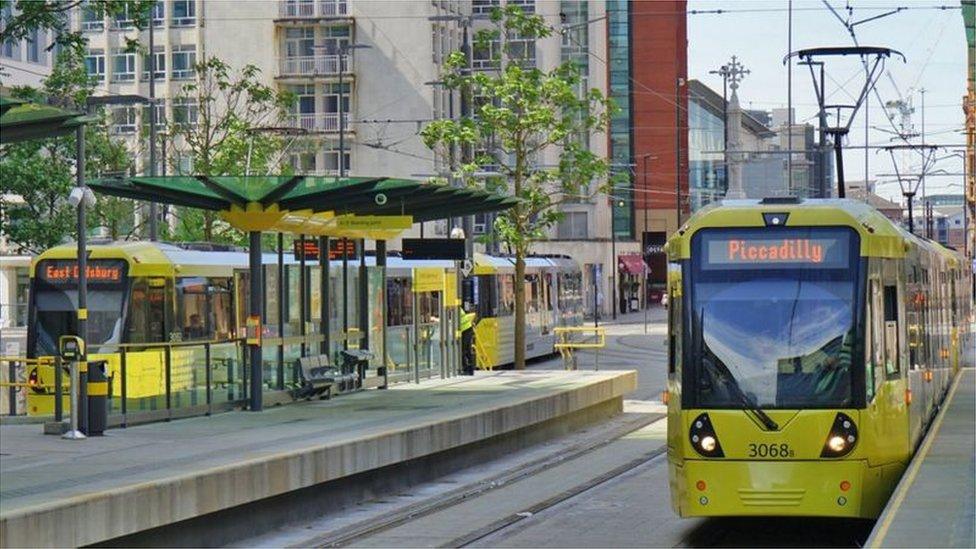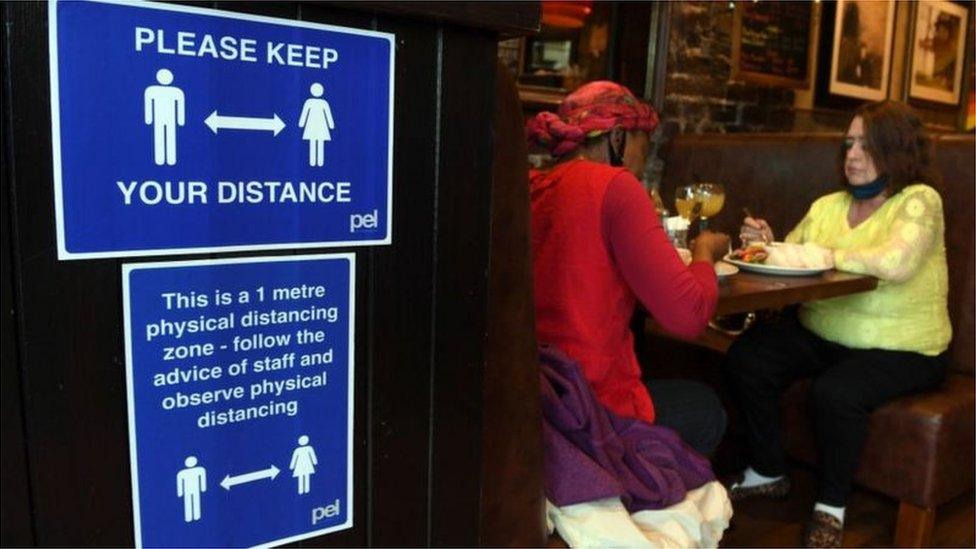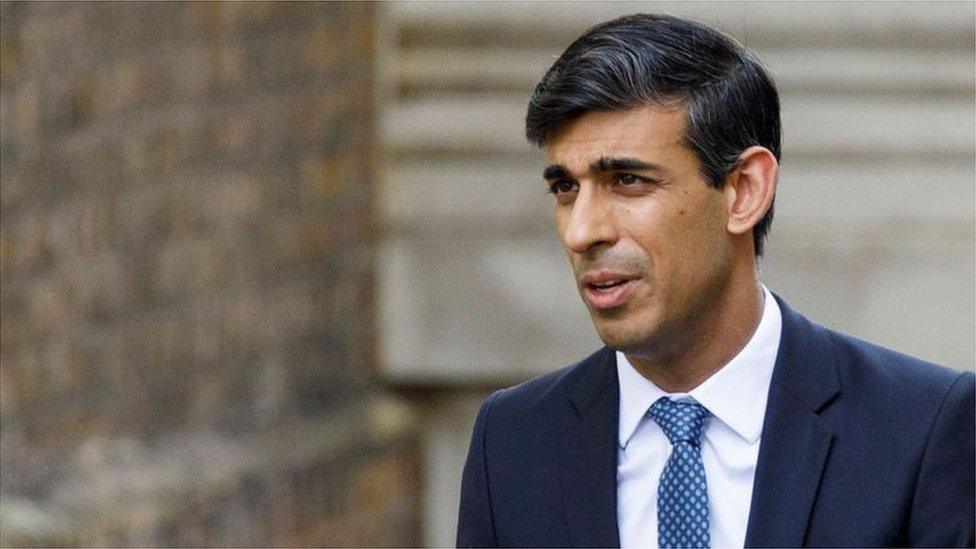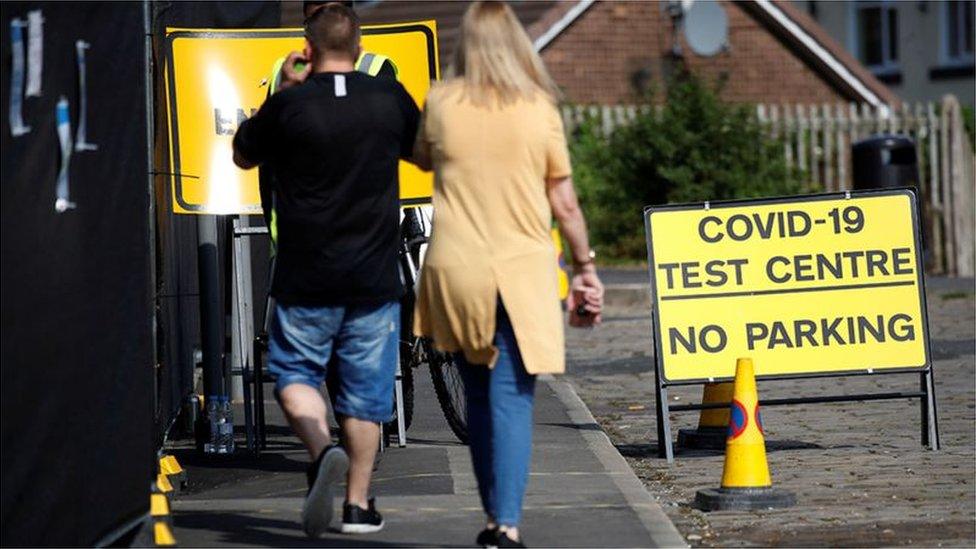The Covid funding gap faultline
- Published

Tensions between Whitehall and the north of England have implications reaching throughout the UK.
Very large amounts of additional crisis funding are coming to Holyrood.
But since funding of crisis measures has become a Holyood battleground, are Tories correct to say the SNP isn't using funds to help business?
Follow the money, and you might find significant new faultlines in this Disuniting Kingdom.
Where finance and the constitution meet an unprecedented public health crisis, Downing Street is losing its grip.
When the Prime Minister speaks to the nation, it turns out his message is only for one of four parts of the nation.
And he doesn't have as much authority as he thought when the message reaches north of Crewe and Stoke.
Mayors in the north of England don't have a funding formula to fall back on as they fight for the funds to compensate businesses for tightening infection controls.
Instead, they have to battle through a series of parallel negotiations with Downing Street, clawing back at huge cuts in the past ten years. Those in leading roles, such as Andy Burnham, Labour mayor of Greater Manchester, are flexing their muscle.
Give us the money to compensate business for closures, pay for testing and the means to enforce new measures, they're saying, and only then will they accede to the requirement to move up a tier, and shut down social contact in commercial settings.
Driving the trams
It's the flipside of the devolved administrations in Holyrood, Cardiff Bay and Stormont, where they have the funding formula in place, and the public health responsibilities to go with them.
But the result is similar: Whitehall doesn't have anything like the levers of control that it thought. That political problem is fuelled by a) that wall of Labour red north of England constituencies turned blue at last December's election and b) the divergent tendencies of a lot of Scots, increasing autonomy asserted by the Welsh, and the hotly contested Britishness of Northern Ireland.
Emboldened by powers and funding over the past ten years, will England's mayors be willing to go back to running the trams after this?
Sarah Longlands, director of IPPR North, a left-leaning think-tank, suggests not: "The UK is already deeply regionally divided and places like the North are particularly vulnerable to the impact of the pandemic because they have been let down by austerity and our uniquely centralised system of governance," she argues.

"In our region, one in four workers earn less than the Real Living Wage. This hasn't happened by accident but is a consequence of an economic and political system that is more centralised than any other comparable country. We already knew that this approach doesn't work, but it's been thrown into sharp relief during the Covid-19 crisis.
"Right now, government should be giving local leaders the powers and resources they need to do "all is takes" to respond to this crisis, to recover, and to build resilience."
Should this matter to the devolved administrations? Potentially and probably, yes. To those who argue for a more federal UK, this is the very moment at which the English regions begin to assert themselves, and when Whitehall and the metro-centric media start paying attention.
Another consequence could be that English regions demand their own allocations through a revised Barnett Formula, 42 years after the first one was devised. If so, it would pose some interesting challenges to the way devolution is financed beyond England.
Northern hostelries
In the meantime, you'd be forgiven for confusion at the big numbers being bandied around in Holyrood campaign skirmishing.
Kate Forbes, the SNP's finance secretary, found £40m to help business through the October restrictions. It's to provide grants for those forced to close of £1,500 or £3,000, depending on rateable value.
For those forced to close and with workers still on furlough, it should help with the 20% employer contribution towards the wage bill.

And there's a discretionary fund for those not forced to close, but hit hard by the consequences of further restrictions, including those outside the central belt, and in the supply chain for the hospitality industry.
Friday brought a First Ministerial hint that travel from the central belt into the less infected north of Scotland could move from strong discouragement to a ban. That would exacerbate the problems of those northern hostelries, already barred from selling alcohol or opening past 6pm.
Furlough funds
Then, along comes Douglas Ross, newish leader of Scottish Tories, with a charge that Ms Forbes is failing to help business with the £700m she's just been handed by the Treasury in London.
There's a mighty big gap between £40m and £700m. So what's going on? I can't say that either side has rushed to help me explain, but let me do my best.
The £40m was announced on Friday 9 October, and appears to have been either taken from an unspent Covid-related fund or raided from another Scottish government budget.
On the same day, the Chancellor, Rishi Sunak, announced a hasty amendment to his winter plan, with the promise of similar grants to firms required to close down for infection control measures.

With that announcement came £1.3bn for sharing between Holyrood, Cardiff Bay and Stormont. Scotland's share of that is around £700m.
According to the Treasury, it is added to extra funds already allocated since the start of the pandemic and the financial year that began soon after, which now reach £7.2bn. That takes Holyrood's total spend this year above £50bn.
Lots more than that £7.2bn has been spent directly by the Treasury in Scotland, through the furlough scheme, business loans paid through banks, and an uplift in Universal Credit.
Feel free to argue amongst yourselves whether an independent Scotland could have done so much. I'm going to leave that question for another time.
Eye-watering test costs
For now, though, is that £700m for business support, as Douglas Ross seemed to be arguing when on BBC One's Question Time?
That's up to the Scottish government to allocate. But it is derived from a Scottish share of several allocations of newly borrowed funds to English spending priorities.
It is rarely made clear how that is derived, and it has become less clear since the Treasury started funding Covid crisis measures by raiding other unspent Whitehall budgets. The more they do that, the less consequence through Barnett.

So far, a very large share of that extra funding has gone into matching England's additional health service costs, for test and trace, which is costing an eye-watering amount, and personal protective equipment for those most vulnerable to infected people.
A much smaller amount is associated with England's business grants scheme. And big sums are required to subsidise bus and rail operators, for whom the current constraints on passenger numbers is leaving them with big losses.
Rishi Sunak has not said how much his grant scheme for businesses will cost. It's an open-ended commitment, depending how many local or regional lockdowns take place.
Raw anger
That makes it impossible to say if the £40m allocated by the Scottish government is more or less generous than the English one, as it only covers this month.
What looks more generous is that there are those extra funds for those not forced to close but affected nonetheless.
And the Scottish scheme is running in October. England's funds this month depend on those mayoral negotiations.
So as with the local part-lockdown strategy itself, it looks messy, unclear and insufficient to do the job beyond the short term.
The raw anger in hospitality at taking the brunt of restrictions on opening hours, alcohol sales, and household combos has not subsided. The Scottish money, we're told "will barely touch the sides" - further evidence, this is going to be a long, tough winter.
